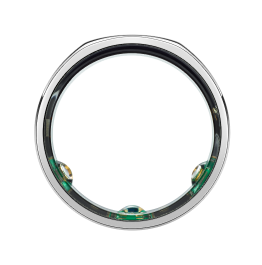An often misunderstood metric, heart rate variability (HRV) refers to the variation in time between consecutive heartbeats. Generally, a higher HRV indicates better adaptability to stressors, while a lower HRV is associated with stress (sympathetic nervous system (SNS) activation) – which may be physical or psychological.
However, HRV is a highly individualized metric, and there aren’t universal benchmarks. A person’s normal HRV can range from 20 to over 200 milliseconds, depending on genetic and lifestyle factors. For this reason, Oura uses your two-week HRV Balance as a Readiness Score contributor — which looks for deviations from your average HRV.
LEARN MORE: What Is the Average HRV?
Can You Improve Your HRV?
“Rather than trying to ‘increase’ your HRV, focus on achieving a stable, or higher-than-normal HRV,” explains Marco Altini, HRV expert and Oura data science advisor. “This is a sign that your nervous system is well-regulated.”
You can regulate your nervous system by adopting strategies that enhance parasympathetic nervous system (PNS) activity, to reduce chronic stress and promote overall well-being. Conversely, stress-inducing habits can lower your HRV. To discover which habits Oura members have found impacted their HRV the most, we reached out to our communities on Reddit, Instagram, and Twitter. Here are some of the most frequent answers.
READ MORE: How To Improve Your HRV (Heart Rate Variability)
What Impacts Oura Members’ HRV?
1. Practicing breathwork and meditation
“Breathing exercises definitely increase HRV. I tested it. Try to breathe strongly in for 4-5 seconds, and then breathe out for 8-10 seconds. The longer you do it, the better. If you do this for many days, your overall HRV increases.”
“Breathwork.”
“Minimizing stress and handling it with activities like box breathing, meditation.”
“Breathwork, mindfulness, gestalt therapy and living from the heart.”
Why: Performing certain breathing exercises and meditation promotes the PNS rest-and-digest system. When you’re stressed, you may tend to breathe rapidly, with shallow breaths. Slow, controlled, deep breathing stimulates the vagus nerve, helping to regulate the ANS. Meditation provides a space for reflection and relaxation while lowering your heart rate, which can be used as a strategy to manage stress.
| Member Tip: You can follow guided breathing and meditation practices straight from the Oura App. Learn how to access Explore content here. |
LEARN MORE: 10 Simple Breathing Exercises for Sleep and Relaxation
2. Consistently exercising
“Staying consistent with my exercise routine.”
“Daily movement, inspired by the active calorie burn goal!”
“A daily run.”
“Walking everywhere.”
“Being more active – walking after dinner.”
Why: A consistent, regular exercise routine leads to a more efficient heart and an ANS that is adaptable in the face of stress. Physical activity releases endorphins and other mood-enhancing chemicals, which can combat stress and anxiety. It also helps you sleep better and emotionally regulate – all contributing to HRV.
Aim to do 75 minutes of high-intensity exercise or 150 to 300 minutes of low or moderate-intensity exercise per week.
LEARN MORE: Defining Low, Medium, and High-Intensity Movement & Using Oura to Track It
3. Spending time outdoors in the sun
“Spending time in the sun for most of the day.”
“I think summer sunshine and outdoor activities have helped too, but not as defined as the top items.”
“Morning sunlight and time outside daily.”
“Walking during sunrise!”
Why: The average person spends 93% of their life indoors, which studies suggest can be detrimental to health, happiness, and HRV. Humans thrive in natural environments – a 2022 study found that just watching a video of nature increases HRV. The main mechanism behind this is stress reduction. Nature has established benefits for alleviating stress: it can lower blood pressure and cortisol levels, reduce SNS arousal, and boost your mood and immune function.
Spending time outdoors in the sun has a particular set of advantages. Sunlight exposure promotes the synthesis of vitamin D. Vitamin D, a vitamin and a hormone, plays a vital role in cardiovascular health and regulating the ANS. Sunlight modulates the circadian rhythm leading to better sleep, and it stimulates serotonin production, which helps you feel happy and relaxed.
4. Getting better quality sleep
“Sleep!”
“Better sleep.”
“Paying attention to your sleep habits.”
“Working out earlier and going to sleep before midnight.”
“Sticking with my recommended bedtime.”
Why: Many of the tips mentioned are partly effective because they improve sleep. Sleep is foundational to good health and a major contributor to HRV (it’s bidirectional – HRV also contributes to good sleep!).
Sleep deprivation is a physiological stressor that can lead to SNS dominance and lower HRV. When you get high-quality sleep, your body undergoes essential repair and recovery. Sleep regulates hormone balance (including cortisol), facilitates emotional processing, and overall allows the ANS to recalibrate.
5. Taking time off work
“Vacation. During the school year, my HRV is low. I don’t get enough sleep, I have stress, I don’t get my exercise in. Now during vacation, I get at least two more hours of sleep a day, no stress, still a lot of exercise, and my HRV is way up. I am a teacher.”
“When I have more than two days off in a row, HRV spikes!”
“Not working.”
“Rest. My Oura Ring lets me know when I have been doing too much and need to take a day to do less.”
“My HRV goes up during summer holidays!”
Why: Going on vacation, taking time off work, or intentionally resting can help to reduce stress and improve HRV. Studies found a vacation can lower cortisol levels as the PNS becomes more dominant, reflecting an HRV increase. Plus, during vacation, you may sleep better, spend more time in the sun, or enjoy the company of friends and family – all of which can contribute to healthy HRV.
Interestingly, Oura data has also shown that many members’ HRV can also drop when they tag vacation. This could be due to the fact that they are changing multiple time zones, indulging in alcohol, or out of their routine.
| Member Spotlight: Oura member Ismail E.noticed that his HRV increases by more than 20% when he spends time with his family, reflecting his improved mood and reduced stress. |
3 Things to Be Wary Of
1. Drinking alcohol
“Reduce/eliminate alcohol consumption.”
“Alcohol [lowers my HRV]. It corresponds to being less rested, having worse sleep, and just feeling less prepared for the following day. I now drink maybe three times a year.”
“Definitely alcohol consumption, especially alcohol consumption after having a heavier exercise day.”
“No alcohol. The increase alone from cutting out alcohol is enough to make me never want to drink again.”
“Drinking. I don’t drink often – my HRV drops 20 points when I do.”
Why: That glass of wine only temporarily reduces stress. As soon as it’s metabolized, the SNS becomes more active, which can cause autonomic dysregulation. This impacts your sleep and affects the release and regulation of neurotransmitters and hormones that play a crucial role in stress regulation, and thus, HRV.
When Oura members tag “alcohol” it’s associated with a median HRV decrease of 12%. Over 70% of members saw at least some negative effect on their HRV. And deep sleep decreases by 6.9%!
LEARN MORE: How Does Alcohol Impact Oura Members?
2. Eating close to bedtime
“No meals 3-4 hours prior to sleep.”
“Not eating heavy meals close to bedtime!”
“No food 3 hours before bed.”
“I eat earlier (and less) in the evening to sleep better.”
Why: When you eat close to bedtime, your body’s focus shifts to digestion, leading to various physiological changes such as an increase in blood flow and a higher resting heart rate. This leaves less time for heart rate recovery overnight, resulting in a lower HRV.
What you eat matters too. HRV is inversely associated with glucose levels, so consuming large portions or sugary, carbohydrate-rich foods (that spike your blood glucose) can cause an HRV decline.
| Member Spotlight: Oura member Jussi L., age 66, saw his HRV double after quitting alcohol, late meals, and adding in an evening walk. |
LEARN MORE: How Late-Night Eating Can Impact Your Sleep
3. Traveling and changing time zones
“Traveling!!! My HRV and my whole body went crazy with timezone changes.”
“Traveling – even if it’s in the same timezone, it messes up my HRV for a couple of days.”
“When I’m traveling too much between huge timezone changes, I tend to mess up my sleep a lot with staying up all night.”
Why: As much as a vacation can lower your stress and boost your HRV, getting there can have the opposite effect. Traveling, especially when there’s a time change involved, can be stressful. A study discovered that a one-hour flight caused a 5 to 39% reduction in HRV, and another study found that changing time zones lowers HRV.
LEARN MORE: 7 Science-Backed Strategies to Manage Jet Lag
Track Your HRV with Oura Tags and Trends
Using the Tags feature on the Oura App, you’re able to see which lifestyle habits or changes contributed to a higher, lower, or stable HRV.
You’ll start to observe correlations between your HRV and certain habits and behaviors. Maybe it’s your evening walk that boosts your nighttime HRV, or you follow a guided breathing session from Oura’s Explore content and notice an immediate spike in your HRV.
| Member Tip: Use the Trends view in the Oura App to see how your HRV has changed over the course of weeks, months, and years. This provides valuable insights into your general health, and how your habits are serving you. |
RELATED: HRV and Stress: What HRV Can Tell You About Your Mental Health





